Select Works of Henri de Lubac (5 vols.)
Digital Verbum Edition
Overview
This collection presents several works by prominent twentieth-century theologian Henri de Lubac. A French Jesuit priest who eventually became the oldest living cardinal before his death in 1991, de Lubac was instrumental in shaping the Second Vatican Council, and composed many valuable theological works during tumultuous times.
Explore Paradoxes of Faith, as de Lubac meditates on the incongruities and challenges of life. Study his celebrated Theology in History. Or examine linguistic tradition in Motherhood of the Church. Through his many writings, de Lubac offers a shining example of theological scholarship, illuminated by Christian humility and love.
In the Verbum editions, these volumes are enhanced by amazing functionality. Important terms link to dictionaries, encyclopedias, and a wealth of other resources in your digital library. Perform powerful searches to find exactly what you’re looking for. Take the discussion with you using tablet and mobile apps. Your software brings the most efficient and comprehensive research tools together in one place, so you get the most out of your study.
You’ll also enjoy the Paulist Press Vatican II Collection (7 vols.).
Key Features
- Collects several works by influential theologian Cardinal Henri de Lubac
- Ranges from intellectual articles to reflective meditations to theological monographs
- Provides insight into the shaping of Vatican II and modern Catholic theology
Product Details
- Title: Select Works of Henri de Lubac
- Author: Henri de Lubac
- Publisher: Ignatius
- Volumes: 5
- Pages: 1,739
- Christian Group: Catholic
- Resource Type: Collected Works
- Topic: Theology
Individual Titles
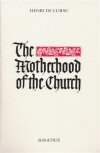
Cardinal Henri de Lubac deeply mines the Christian tradition in examining the motherhood of the Church. Priests are called “Father” and the Church is called “Mother.” Our “Holy Mother the Church” is a traditional way of speaking among Catholics. Focusing on the Church’s motherhood allows this great theologian to unite two profound truths: the Church is the Bride of Christ and the Church is Christ’s mystical body. As de Lubac shows, the Church cannot be rightly considered apart from Christ and his saving work, both of which should be understood in light of the mystery of the Church’s maternity.
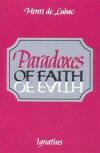
Paradoxes of Faith is a collection of profound aphorisms and reflections that are the fruit of Cardinal Henri de Lubac’s study over the course of his life on the themes of Christianity. They are rich and thought-provoking gems, spiritual aphorisms, and meditative reflections that express the freshness and tensions of the spiritual life.
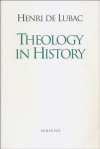
The unique insight and impressive scholarship of the eminent French theologian Cardinal Henri de Lubac are clearly evident in this volume of collected articles and essays.
The first section is devoted to patristics and Christian humanism. Cardinal de Lubac includes an article on the priesthood according to St. John Chrysostom and a study of the debate over Origen’s salvation, among others.
The second section represents an unpublished work on tripartite anthropology tracing the body-soul-spirit distinction from St. Paul, the patristic tradition, St. Augustine, and St. Thomas Aquinas up to the modern period. It concludes with a beautiful text entitled “The Light of Christ,” a prayerful meditation written during the dark hours of Nazi domination.
Section three wrestles with disputed theological questions such as the disappearance of the sense of the sacred, the mystery of the supernatural, and the development of dogma. Cardinal de Lubac discusses Christian resistance to Nazism and anti-Semitism, as well as the works of important modern spiritual writers.
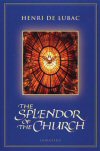
Considered by many the bright jewel among the many enriching books of Cardinal Henri de Lubac, this work is a hymn to the beauty of the Church. Having suffered unjustly under Church leadership for a time, The Splendor of the Church is a personal testimony of this great theologian’s humility and love of the Church of Christ. It is also a classic work in theology. Cardinal de Lubac’s profound insights significantly contributed to Vatican II’s Dogmatic Constitution on the Church, Lumen Gentium—especially in its treatment on the Church as mystery and as the Sacrament of Christ.
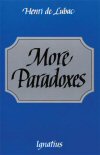
Following up his first book, Paradoxes of Faith, Cardinal Henri de Lubac’s More Paradoxes presents thought-provoking gems that once again illustrate the magnificent language, clarity, spiritual understanding and shrewd discernment of the great theologian.
Cardinal de Lubac’s insights are rich and profound meditations, aphorisms, and pieces of wisdom that express the freshness, incongruities, and challenges of life. This is a book of inspiration by a master of the spiritual life that provides excellent material for prayer and meditation, as well as great homily ideas for the clergy.
About Henri de Lubac
Cardinal Henri de Lubac (February 20, 1896–September 4, 1991) is considered one of the outstanding theologians of the twentieth century. He was born in France and became a Jesuit priest in 1927. He taught theology at the Catholic University of Lyon from 1929 to 1961. His courses were interrupted twice, once by World War II and again from 1950 to 1958 over a disagreement with Pope Pius XII on certain points of dogma. After these “dark years” ended de Lubac was returned to teaching and grew in influence as a theologian. He was instrumental in shaping the Second Vatican Council and admired by successive pontiffs, eventually accepting an appointment to the cardinalate from Pope John Paull II. He wrote numerous books on spiritual and theological topics including The Christian Faith, Aspects of Buddhism, Catholicism, Corpus Mysticum, and The Eternal Feminine: A Study on the Poem by Teilhard de Chardin.
You’ll also enjoy the Paulist Press Vatican II Collection (7 vols.).
Key Features
- Collects several works by influential theologian Cardinal Henri de Lubac
- Ranges from intellectual articles to reflective meditations to theological monographs
- Provides insight into the shaping of Vatican II and modern Catholic theology
Product Details
- Title: Select Works of Henri de Lubac
- Author: Henri de Lubac
- Publisher: Ignatius
- Volumes: 5
- Pages: 1,739
- Christian Group: Catholic
- Resource Type: Collected Works
- Topic: Theology
About Henri de Lubac
Cardinal Henri de Lubac (February 20, 1896–September 4, 1991) is considered one of the outstanding theologians of the twentieth century. He was born in France and became a Jesuit priest in 1927. He taught theology at the Catholic University of Lyon from 1929 to 1961. His courses were interrupted twice, once by World War II and again from 1950 to 1958 over a disagreement with Pope Pius XII on certain points of dogma. After these “dark years” ended de Lubac was returned to teaching and grew in influence as a theologian. He was instrumental in shaping the Second Vatican Council and admired by successive pontiffs, eventually accepting an appointment to the cardinalate from Pope John Paull II. He wrote numerous books on spiritual and theological topics including The Christian Faith, Aspects of Buddhism, Catholicism, Corpus Mysticum, and The Eternal Feminine: A Study on the Poem by Teilhard de Chardin.
Reviews
0 ratings